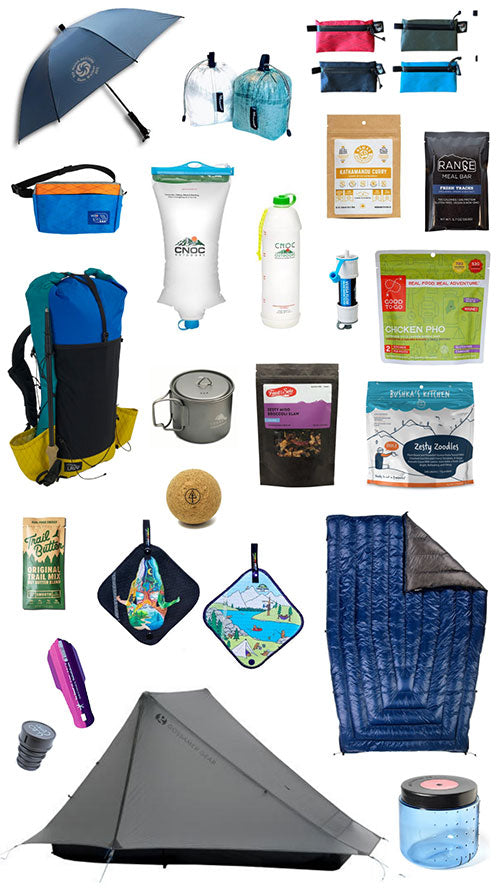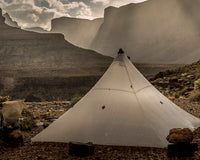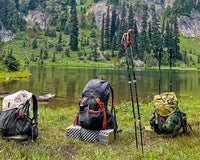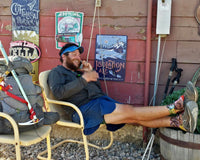
On a recent multi-day thru-hike, my partner Mat and I met a group of women on trail who were perplexed at the small size and light weight of our backpacks. After fielding a barrage of questions, the oldest member of the group looked at her big pack, then back at ours and asked bluntly, "So, how do you go ultralight?"
Great question! First, things first, what is ultralight?
Opposite from the more traditional backpacking setups of just a few decades ago, ultralight hikers focus on how little their bag weighs. A lighter bag is easier on your body, allows you to travel further in more comfort, and might just allow you to hike later into life as you reduce the possibility for pain, stress and injuries.
What is Base Weight?

Base weight is a term that refers to the total weight of all the gear in your backpack, including the backpack itself, but excluding the weight of your food and water. It is generally accepted that:
- > 20lb / 10kg = Heavyweight
- 12-20lb / 5-10kg = Lightweight
- 6-11lb / 3-5kg = Ultralight (UL)
- < 6lb / 3kg = Super Ultralight (SUL)
While many ULers can get a bit obsessive about the numbers on a scale, lightening your load is more about finding your unique sweet spot of weight, comfort, safety and enjoyment while trekking.
Bring Less Stuff

"The easiest and cheapest way to go ultralight is to bring less stuff," laughs Dan Gerken of Anda Ultralight, who went from carrying a 50+ lb pack on the John Muir Trail in 2018 to a 9.5 lb pack on the PCT in 2023.
It might sound simple, but pairing down is often the single hardest step. It's easy to load things into a bag at home that your body won't bear the brunt of until later on.
Dan suggests meticulously going through all of the items in your pack before you leave on your hike and asking yourself some honest questions:
- Does this item keep me safe?
- Do I need it to be comfortable?
- Is this a want or a need?
Consider doing this a few times over, preferably when you're well rested, and see what you can shed.

"Extra clothes and electronics are two places where people, myself included, can really pair down," explains Dan, adding that your personal priorities and the type of adventure you're going on will dictate those decisions.
It will likely take a few outings before you figure out which ‘luxury items' you can do without. They are often the ones you brought for comfort, but never end up using.
Carrying around this deadweight uses up precious energetic resources that are better spent enjoying your adventure, and you'll be surprised how quickly you adapt to life without them.
One of the best parts of 'bringing less stuff' is that it's a free way to lighten your load, no gear upgrades necessary.
Take Dan's advice: "Just don't put it in your bag".
The Big Three — Sleep System, Shelter & Pack

Another great way to reduce your base weight is to swap out heavy or bulky items for lighter and less voluminous gear.
Often referred to as 'the big three' — your sleep system (quilt or sleeping bag and ground pad), shelter and backpack — account for the most amount of weight of all your gear, so aiming to have them all add up to around 6.5lbs is a good goal.
Since sleep is your superpower, getting a comfortable and lightweight sleeping pad and quilt/ sleeping bag that works for your style of slumber (ie. side sleeper, cold sleeper, etc) is a good start.
Then you can focus on a lightweight shelter that suits your needs (freestanding, trekking poles, tarp, bivy, hammock, etc.) so that when it comes time to buy yourself a new backpack, you'll know everything you've purchased will fit inside.

After years of slowly transitioning to ultralight Gilad Nachmani from CNOC Outdoors, has some thoughtful suggestions for how to start the process.
"Upgrading the sleep system can have the greatest effect," Gilad says, "but it tends to be pricey."
"If you are short on money, I'd say hydration, cooking, eating gear and the ‘ditty bag’ are worth upgrading first, as they tend to be cheaper and can have a big effect on weight in aggregate."

Going back to point number one, Gilad also emphasizes that "upgrading small items is more of a practice of cutting items out, rather than upgrading them."
While it can be inspiring and insightful to look at others' gear lists, it's good to remember what works well for one person might not be a fit for another.
Cooking & Food Considerations

On that note, what type of food you plan to eat on trail and how you plan to prepare it affects the weight and volume of your bag.
Making sure we stay properly fed and watered is vital to the safety and enjoyment of our adventures. Fill your food bag with snacks that are high in calories, but take up smaller amounts of space. Think nuts, hard cheeses, cured meats and energy bars.
Going stoveless may save you space, weight and money, but if you can't bear the thought of life without a hot meal or morning coffee, then it might not be for you. If you bring a stove, throw in some lightweight, dehydrated meals to save on water weight.
What Ultralight Gear to Buy?

Sourcing new, high-quality ultralight gear is more accessible than ever thanks to a surge in talented makers, as well as resources like GGG that make it easy to find UL cottage brands all in one place.
Or, if you're crafty, there is a huge make your own gear (MYOG) movement as well, and great textile distributors like Ripstop by the Roll for the raw materials.
As far as budget is concerned, you can splash out on custom, cottage brand offerings, save a buck through online sales, or buy gently used UL gear for a reduced price through a variety of online options.
The gear you currently own is worth something to someone else, too, so selling it or donating it to thrift stores, charities or non-profits will keep it from collecting cobwebs in the closet.
Care for Your Body

Another often overlooked, but incredibly important consideration that Gilad highlights when thinking about going ultralight is your body.
"Carrying ourselves is hard and it is always on us," says Gilad, "so staying fit and strong for backpacking tends to make the biggest impact for me as it will make the rest of the carry, distance or time on the trail more manageable."
Reducing the weight of your backpack will help alleviate the amount of stress and tension on your body, but being healthy, strong and capable of carrying it is a huge help too.
Let's Recap

At the end of the day, there is no right or wrong way to go ultralight, just many trails that lead to the same place.
As Dan from Anda UL so eloquently put it, "It's all about figuring out whatever makes your hike enjoyable, and so long as you're enjoying it and comfortable to whatever subjective level that is, then you're doing it right."

Start with getting rid of the things that you don't really need in your pack. At the end of each trip, analyze what you brought, what you used and what you didn't.
If you didn't use an item on your trip, don't bring it on the next one, unless it's something like a first aid kit or rain layers that you don't use every time.
Then, tackle your big three — sleep system (sleeping pad + quilt/bag), shelter and pack — to shave some big ounces. Buy your pack last so that you know it will hold all of your gear.

Narrow in on your clothing, cooking kit, food and small accessories like electronics and stuff sacks, as these items can quickly add up.
The journey of going ultralight is as much an adventure in getting to know yourself as it is about anything else, so take inspiration from others but ultimately tune into your unique, individual needs.
If you can tailor your pack list to meet the changing demands of each adventure while remaining safe, excited and enthusiastic, your overnight bag will be feeling like a day bag in no time, and you'll be feeling on top of the world.
Ali Becker is a freelance adventure writer and narrative storyteller who shares compelling conversations about personal transformations, overcoming limitations, wellness education and adventurous situations. You can follow her rambling adventures on social at @thisisalibecker.
















3 comments
Ace Curtis
Lightening my load has helped me so much. I used to carry about 40lbs when I first started, and I was miserable. I have an UL setup now and I get to spend my days being grateful for the beauty around me, rather than stressing about how heavy my load is. Great article! Fun read and LOVED the photos.
Michael Gladden
Great article!
Ina Snip
Great article Ali. I’m taking it all in. And starting to source UL gear.